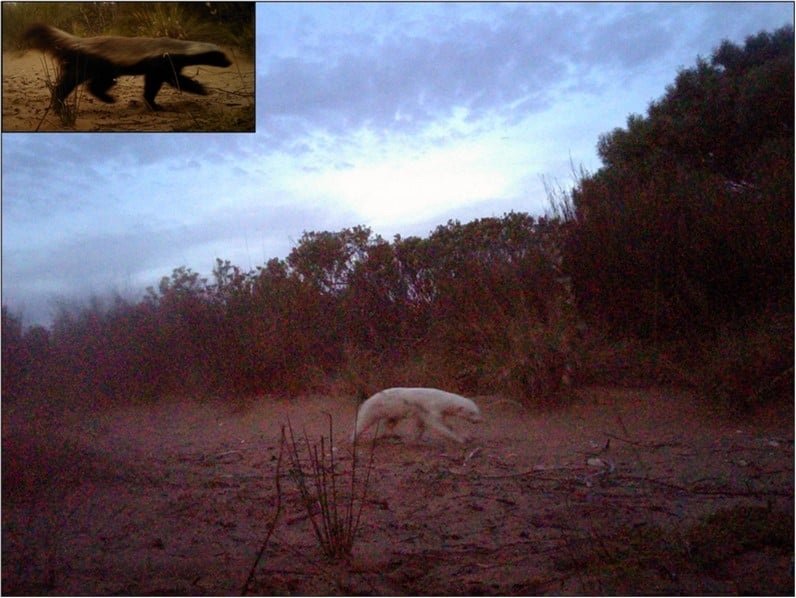Tourism Officer (Level 8) Position
CapeNature seeks to employ a suitably qualified, experienced and customer-centric individual as the Tourism Officer.

The honey badger, spotted on a camera trap at De Hoop Nature Reserve, is albino and is the first to be recorded in scientific literature. Cape Nature
• A rare albino honey badger had been recorded at De Hoop Nature Reserve in the Western Cape.
• The recording is the first in scientific literature of the rare honey badger.
• It was spotted by a camera trap set up as research for the establishment of a penguin colony.
A rare honey badger has made an appearance on camera - and presented local conservations with a unique scientific find. The honey badger, spotted on a camera trap at De Hoop Nature Reserve in the Overberg region, is albino, and is the first to be recorded in scientific literature.
The camera trap is part of BirdLife South Africa and Panthera research to determine the abundance of predators in the nature reserve. This research will be used to determine if it is safe to establish a new penguin colony at De Hoop.
African penguin populations are dwindling, primarily due to a lack of food. A project is under way to reintroduce a penguin population at De Hoop – an effort abandoned in 2003 due to predation by caracals.
The project has seen life-like penguin decoys and penguin calls being broadcast by loudspeakers to help create the impression that penguins are breeding there. In addition, 30 penguin fledglings were released at the site earlier this year.
“While the purpose of the camera trap survey was focused on species such as leopard and caracal, which have been known to predate on penguins, all species captured on the cameras were recorded,” the organisation said in a statement.
Among the images captured was the extremely rare albino honey badger. Albinism is an inherited condition that occurs due to a reduction in or absence of melanin formation. The albino honey badger is completely white, unlike the species' usual black and off-white colouration.
This is the second sighting of an albino badger in the area, although the first on camera. An albino honey badger was spotted near Prince Albert last year, but not filmed.
Honey badgers are seldom spotted in the game reserve because they are nocturnal and rarely seen during the day, explains Cape Nature spokesperson Petro van Rhyn. As a result, it is unclear exactly how many live in the nature reserve.
She said:
They generally occur at quite low densities. The only way to determine population size within a conservation area is to set out enough trap cameras to determine the presence and movement of these animals at night. Or to physically trap, mark and recapture members of a population.
View video of fierce honey badger saving her baby from a leopard here.
"Population size is also determined by the availability of food which in turn determines the size of home ranges and territories. It was found that these animals can travel between 10 to 27 km per day in search of food or a mate."
READ | Free access to CapeNature reserves ahead of Heritage Day
Honey badgers enjoy stable population numbers and are not under threat. They do, however, often come into conflict with beekeepers due to their love of honey.
"Fortunately, since 2001, a successful awareness campaign and the development of methods to protect beehives from Honey Badgers have led to the peaceful co-existence with this species," said Van Rhyn.
The reserve has a group of field rangers dedicated to protecting all species, with anti-poaching patrols and fence inspections for snares done regularly.
However, the albino honey badger is likely to have some challenges.
"Albinism generally results in reduced fitness for wild animals, which means a reduced chance of survival, and as a result, it is an extremely rare trait as natural selection reduces the chances of this gene being passed on," Cape Nature said.
CapeNature is a governmental organisation responsible for managing wilderness areas, nature reserves and marine protected areas in the Overberg and further afield in the Western Cape Province of South Africa. Besides being nature’s custodians, championing unique ecosystems which includes World Her...
View ProfileXplorio is your local connection allowing you to find anything and everything about a town.
Read MoreCapeNature seeks to employ a suitably qualified, experienced and customer-centric individual as the Tourism Officer.
The ultimate aim of the Two Oceans Aquarium turtle rescue, rehabilitation and release programme is to get turtles back into the ocean.
Thank you to everyone who entered our CapeNature “Win a Wild Card” Competition, it’s time to announce the winner!
CapeNature is giving one lucky South African resident the chance to win a Family Wild Card.
CapeNature is giving one lucky South African resident the chance to win a Family Wild Card.
CapeNature is giving one lucky South African resident the chance to win a Family Wild Card.
